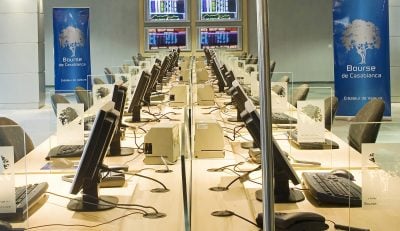A combination of the oil price decline and Covid-19 has prompted international rating agency Fitch to downgrade Nigeria’s banking sector to negative but the medium-term outlook is relatively stable, says Mahin Dissanayake, senior director, banks, Africa and the Middle East, Fitch. Interview by Rafiq Raji
What is the medium-term outlook for Nigerian banks?
Our medium-term outlook for the Nigerian banking sector is negative. As the twin shocks of the oil price fall and the coronavirus began to unfold, we took action on all of the Fitch-rated Nigerian banks.
The rating actions reflected severe downside risks arising from the weakening operating environment and its negative impact on other rating factors.
Our expectations were (and remain) that asset quality will deteriorate over the next 12 months, mainly from the banks’ exposure to the oil and gas sector. Asset quality risks will also arise from other sectors hit by social containment measures, such as manufacturing and trade. At this stage, it is very difficult to predict how bad it will get or even provide you with a forecast impaired loan ratio for FYE20.
Based on our experiences from 2015/2016, the current oil price shock will adversely impact the oil and gas sector. This sector accounts for around 30% of the banks’ gross loans, of which a large proportion was restructured during the previous crisis (some are still classified as Stage 2 under IFRS 9).
Our stress tests show that asset-quality risks arising from deterioration of the banks’ oil and gas exposures are the biggest threat to their ratings. Additionally, we expect the non-oil segment to be impacted by the slower economy, but also due to the fallout of the coronavirus, which could severely affect households, businesses and industries. It would particularly test the quality of consumer and SME loans.
What is the impact on earnings?
Banks’ earnings and profitability will weaken in the medium term. This reflects lower activity (slower loan growth in particularly), the low interest rate environment, low yields on government securities, lower income from debt relief measures and rising credit costs.
That said, most banks are expected to remain profitable in 2020 due to their revenue-generating capacity and low cost of funding (from large and stable customer deposit bases). Banks will start reporting losses only if asset quality deteriorates faster than we expect.
On balance, the near-term impact on funding and liquidity will be tolerable. The primary risk is that lower oil revenues (and Nigeria’s falling FX reserves) could limit banks’ access to foreign currency liquidity and limit their ability to meet foreign currency obligations.
While we saw this in the last crisis, we are not at this stage yet. Furthermore, adverse global conditions could impede some banks in raising external financing. Local-currency liquidity remains strong with banks funded mainly by low-cost customer deposits.
A significant outflow of foreign portfolio investors from Nigeria would have a significant impact on the financial markets as well as Nigeria’s FX reserves. This will in turn impact foreign currency supply in the banking sector and in the broader economy.
What other concerns do you foresee?
A major concern for banks stems from currency devaluation risk. This risk will gain further prominence if Nigeria’s FX reserves continue to deplete.
Currency devaluation would affect the banks directly, given their dollarised balance sheets and therefore the impact on banks’ capital ratios, and indirectly from their borrowers being affected (this will cause asset quality problems).
Regulatory intervention remains another risk for the banks due to measures like the punitive minimum loans to deposit requirement, and cash reserve requirements.
The Central Bank of Nigeria (CBN) is unwilling or unable to ease these requirements. Policy measures from the CBN can be unpredictable and contradictory, and credit negative in our view.
All the Fitch-rated banks are currently on Rating Watch Negative (RWN). Rating Watches indicate that there is a heightened probability of a rating change and the likely direction of such a change. The Negative indicates that the rating could stay at its present level or potentially be downgraded.
The RWN reflects our expectations that all Nigerian banks will face material pressures from a weaker operating environment over the next few months given the oil price crash, potential further devaluation of the naira and the impact of the pandemic on individuals and businesses. While the full extent of the financial impact is not yet known, our view is that risks are firmly skewed to the downside.
Even before the current crisis, Fitch’s sector outlook for the Nigerian banking sector was negative, which reflected tough operating conditions, including slowing GDP growth, rising regulatory risks and potential performance pressures.
Is Nigeria on the cusp of another banking sector crisis?
Going into 2020, the banks were in fairly good shape and therefore, at this stage, we are not expecting another full blown banking crisis.
It really depends on the duration and severity of the coronavirus and oil price fall. Nigerian banks have reasonable loss absorption buffers, underpinned by strengthened capitalisation since the last crisis. This gives us some reassurance that Nigeria is not on the cusp of another banking sector crisis.
But as I said earlier, risks have risen significantly since February and to a level that this has affected ratings and has the potential to result in further rating actions (hence the RWN). In the near term, still healthy earnings will continue to absorb larger credit losses but future profits will be under pressure from slowing loan growth, reduced client activity and higher levels of provisioning for expected credit losses under the IFRS 9 accounting framework.
It is also worthwhile differentiating the big banks from the small banks as operating environment risks will affect them differently. While the Tier 1 banks have the franchise benefits which would allow them to absorb shocks to a good degree, it is not the same for Tier 2 or Tier 3 banks. These banks are particularly vulnerable to credit concentration risk and risks to their capitalisation.
Do you see another round of consolidation?
Yes, this is a possibility. However, it is worth remembering that there are much fewer banks than in the last systemic crisis in 2019 and therefore consolidation may not make strategic sense. Banks will only merge or be acquired these days only if they are facing significant problems. It would not be a commercial decision to merge or be acquired.
Is there a need for a government bailout package for the sector?
At this stage, we are not seeing the need for a government bailout for the sector. Recently, the governor of the CBN publicly stated that the regulator stands ready to provide liquidity backstops as and when required.
Furthermore, in response to the coronavirus, the CBN announced a number of relief measures which should alleviate some near-term asset-quality pressures. These include requesting banks to restructure loan tenors and terms for consumers and businesses that are most affected, particularly borrowers in the oil and gas, agriculture and manufacturing sectors.
Want to continue reading? Subscribe today.
You've read all your free articles for this month! Subscribe now to enjoy full access to our content.
Digital Monthly
£8.00 / month
Receive full unlimited access to our articles, opinions, podcasts and more.
Digital Yearly
£70.00 / year
Our best value offer - save £26 and gain access to all of our digital content for an entire year!

 Sign in with Google
Sign in with Google 



